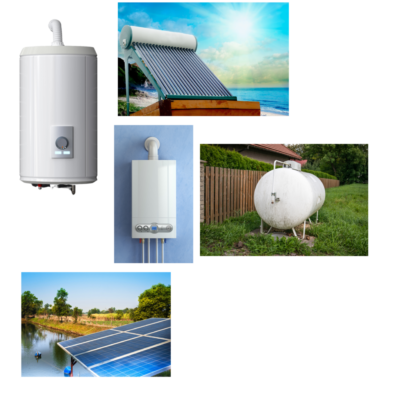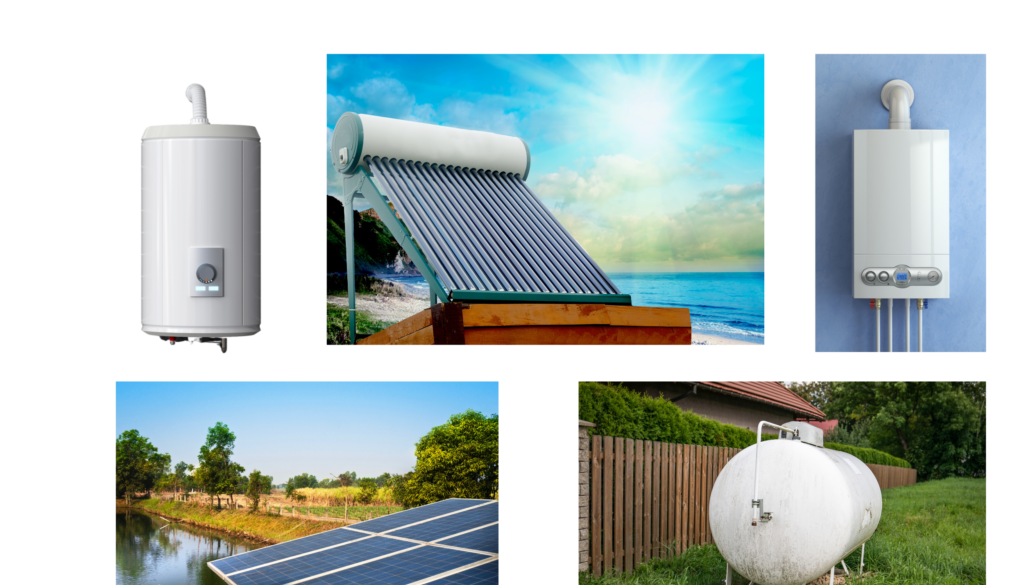Choosing Between a Heat Pump Water Heater, Boiler, Solar Panels, Propane, and More: What’s Best for Your Home?

Making the Best Decision for Your Home Heating System
Choosing the right heating system for your home can be a daunting task. With numerous options available, ranging from traditional boilers and propane heating systems to more energy-efficient alternatives like heat pumps and solar-powered solutions, it’s important to understand the costs, benefits, and potential savings associated with each. Homeowners today are also more focused on eco-friendly choices, looking for ways to reduce their energy consumption, save on utility bills, and take advantage of available rebates and incentives.
In recent years, there has been a growing shift towards more energy-efficient heating solutions, like heat pump water heaters and solar-powered systems, both of which promise lower energy usage and smaller carbon footprints. At the same time, traditional systems such as boilers and propane heating systems continue to serve as reliable, tried-and-true methods for heating homes—especially in colder climates where these systems excel. Understanding the pros and cons of each system can help you make an informed decision about which option is best for your home and your budget.
One of the most important factors to consider when investing in a new heating system is cost. This doesn’t just mean the upfront price of installation, but also the long-term savings on your energy bills, potential rebates, and how quickly the system will pay for itself. Some systems, like heat pumps, offer the advantage of heating and cooling in one unit, making them a year-round solution that can significantly reduce your overall energy use. Other options, like solar panel systems, require a higher initial investment but can deliver substantial savings over time, particularly with the availability of federal and state incentives.
Whether you’re upgrading an old system, building a new home, or simply exploring ways to make your home more energy-efficient, this guide will provide you with a detailed breakdown of several heating options. We’ll cover heat pump water heaters, boilers, propane heating systems, solar panel systems, and community solar programs—giving you the information you need to evaluate the initial costs, rebates, maintenance requirements, and expected savings for each system.
In addition, we’ll explore DIY solar installations and even creative solutions like installing solar panels on a gazebo—which can be a perfect solution for homeowners with limited roof space. Each system has its unique advantages and disadvantages, and by comparing the costs and savings, you’ll be able to decide which is the right fit for your home, budget, and energy goals.
To help you in this process, we’ve also included a comparison chart that outlines the initial costs, potential rebates, monthly and yearly savings, and the break-even periods for each heating system. By understanding the long-term financial benefits of each option, you can make a decision that not only keeps your home warm and comfortable but also saves you money in the long run.
- Heat Pump Water Heater
If you’re a PSEG Long Island residential customer, the rebate programs for ENERGY STAR Certified Electric Heat Pump Water Heaters can make this an attractive option.
- Pros: Energy-efficient, lower operating costs, rebates available.
- Cons: Higher upfront cost, may be less effective in colder climates.
- Estimated Cost: $1,200 – $2,500 (with installation).
- Annual Savings: Up to $300 on water heating bills.
- Boiler Systems
Boilers are a reliable choice in colder regions, providing consistent heat throughout your home.
- Pros: Reliable heating in cold climates, durable with long life spans.
- Cons: High replacement costs, generally less energy-efficient than other systems.
- Estimated Cost: $3,000 – $5,000 (for a 2000 sq ft home).
- Annual Savings: $100 to $300 (depending on efficiency of the new boiler).
- Heat Pump Systems: How Do They Work?
A heat pump is a versatile system that can both heat and cool your home. The system transfers heat rather than generating it, making it more energy-efficient.
How Does a Heat Pump Work?
A heat pump operates by transferring heat between the inside and outside of your home. During winter, it extracts heat from the outdoor air (even in cold temperatures) and transfers it indoors. In the summer, the system reverses, pulling heat from inside your home and releasing it outside, effectively cooling your space. Because heat pumps move heat instead of generating it (like traditional systems), they can be up to three times more energy-efficient than boilers or electric heaters.
- Pros: Can both heat and cool your home, energy-efficient, lower operational costs.
- Cons: Less effective in regions with extreme cold, higher upfront costs.
- Estimated Cost: $3,000 – $8,000 (with installation).
- Annual Savings: $500 to $700 (on heating and cooling costs).
- Is a Heat Pump Better Than a Boiler?
In moderate climates, a heat pump provides more efficient heating and cooling. However, in colder areas, boilers may provide more consistent warmth.
- Solar Panels
Switching to solar energy can significantly lower your energy bills, and there are multiple ways to harness solar power for your home, including rooftop panels, solar gazebos, or even community solar.
DIY Solar Panel System:
- Pros: Lower installation costs, control over your system, potential for tax credits and rebates.
- Cons: Requires technical knowledge, maintenance responsibility.
- Estimated Cost: $10,000 – $15,000 (for a 2000 sq ft home, DIY installation).
- Annual Savings: $1,000 to $1,500 (on electricity bills).
Solar Gazebo:
- Pros: Combines outdoor shade with solar energy generation, great for backyard setups.
- Cons: Limited energy production compared to roof-mounted systems.
- Estimated Cost: $3,000 – $6,000 (for a solar-powered gazebo).
- Annual Savings: $300 to $500.
Community Solar:
For those who can’t install solar panels directly, community solar allows you to participate in renewable energy.
- Pros: No installation required, supports renewable energy, potential utility bill savings.
- Cons: You don’t own the system, savings are lower compared to home-installed solar panels.
- Estimated Cost: No upfront cost, typically subscription-based.
- Annual Savings: $100 to $200 (on electricity bills).
- Propane Gas Heating
For homes in areas without access to natural gas, propane is another viable heating option. Propane systems are often used in rural areas and are known for their reliability and efficiency.
- Pros of Propane Heating:
- Efficient: Propane burns hotter and more efficiently than natural gas or electricity.
- Versatile: Can be used for heating, cooking, and water heating.
- Reliable: Propane can be stored on-site, making it useful in areas with frequent power outages.
- Cons:
- Fuel Costs: The price of propane fluctuates and can be more expensive than natural gas.
- Storage Requirements: Requires a propane tank on your property.
- Estimated Cost:
- Propane heating installation costs between $2,500 to $7,000.
- The cost of propane is approximately $2.50 to $3.00 per gallon, and a 2000 sq ft home might use 500-1,000 gallons per year.
- Annual Savings: Propane systems may save between $500 to $1,000 annually on heating costs compared to electric heating, depending on usage and fuel price fluctuations.
Price and Savings Comparison Chart
|
Option |
Estimated Cost |
Potential Annual Savings |
|
Heat Pump Water Heater |
$1,200 – $2,500 |
$200 – $300 |
|
Boiler Replacement |
$3,000 – $5,000 |
$100 – $300 |
|
Heat Pump System |
$3,000 – $8,000 |
$500 – $700 |
|
DIY Solar Panel System |
$10,000 – $15,000 |
$1,000 – $1,500 |
|
Solar Panels on Gazebo |
$3,000 – $6,000 |
$300 – $500 |
|
Community Solar (subscription) |
No upfront cost |
$100 – $200 |
|
Propane Heating System |
$2,500 – $7,000 |
$500 – $1,000 |
- Heat Pump Water Heater: A great energy-efficient option if you’re eligible for rebates and live in a moderate climate.
- Boiler Replacement: Best suited for homes in colder climates where reliable heating is essential.
- Heat Pump System: Ideal for homes needing both heating and cooling, especially in regions with mild winters.
- DIY Solar Panels: Offer the most long-term savings but require a high upfront investment and technical expertise.
- Solar Gazebo: A creative option to generate some solar energy while enhancing your outdoor space.
- Community Solar: A perfect option for renters or homeowners who cannot install panels but want to support renewable energy.
- Propane Heating: A reliable and efficient heating option for homes without access to natural gas, with fuel price fluctuations being the main concern.
By evaluating the pros, cons, and potential savings of each system, you can confidently choose the best energy solution for your home and lifestyle.
Frequently Asked Questions: Yearly Maintenance for Energy Systems
- How often should I perform maintenance on my heat pump water heater?
- Answer: It’s recommended to service your heat pump water heater once a year. This includes checking the filters, cleaning the coils, inspecting the heat pump unit for leaks or blockages, and ensuring the thermostat is functioning correctly. Regular maintenance can extend the lifespan of the unit and maintain its efficiency.
- What are the yearly maintenance tasks for a boiler system?
- Answer: For boiler systems, annual maintenance includes checking the pressure, cleaning the heat exchanger, testing the safety controls, bleeding radiators, and inspecting for any leaks or corrosion. Hiring a professional for a yearly inspection is recommended, as it ensures the system is operating safely and efficiently.
- Do heat pumps require yearly maintenance?
- Answer: Yes, heat pumps require annual maintenance to ensure they operate efficiently. This includes cleaning or replacing the air filters, inspecting the coils and fan, checking refrigerant levels, and ensuring the outdoor unit is free of debris. Scheduling a professional tune-up is a good way to keep the system running smoothly year-round.
- What kind of maintenance do solar panels need?
- Answer: Solar panels are generally low maintenance, but it’s important to check them once a year. Maintenance tasks include cleaning the panels to remove dirt, dust, and debris (especially in areas with low rainfall), inspecting the inverter for any error messages, and checking for any shading issues from nearby trees. Many solar companies offer yearly inspections as part of their service.
- How do I maintain a gazebo with solar panels?
- Answer: Maintenance for a solar gazebo includes cleaning the solar panels regularly, especially after seasons with heavy pollen or debris. You should also inspect the gazebo structure for any wear or damage and ensure the electrical connections between the panels and inverter are secure. Annual inspections are recommended to ensure the system’s efficiency.
- Is there any maintenance needed for a community solar subscription?
- Answer: No, with community solar, there’s no maintenance required on your part. The solar farm owner or operator takes care of all the maintenance and upkeep of the solar panels. You simply receive the benefits of the energy savings on your utility bill without any hands-on responsibilities.
- How should I maintain a propane heating system?
- Answer: Propane heating systems should be inspected annually by a professional. Maintenance tasks include checking the propane tank for leaks, cleaning the burner and heat exchanger, and ensuring that the system’s pressure and efficiency levels are optimal. Regular service will ensure safe and efficient operation during the colder months.
- What if I miss a year of maintenance for my system?
- Answer: While missing a year of maintenance isn’t necessarily catastrophic, it can reduce the efficiency of your system and increase the risk of breakdowns. For heating systems like boilers, heat pumps, or propane heaters, missing maintenance can result in higher energy bills and potential safety concerns. It’s best to catch up on maintenance as soon as possible to prevent long-term issues.
- Are there any DIY maintenance tasks I can handle on my own?
- Answer: Yes, for most systems, there are simple maintenance tasks you can do on your own:
- For heat pumps and boilers, regularly change or clean the filters and keep the area around the units clean.
- For solar panels, you can clean the surface with a hose or a soft brush.
- For propane heaters, you can monitor the tank levels and ensure there are no obstructions near the vents.
However, it’s still important to have a professional conduct an annual inspection to address more technical aspects.
- How much should I expect to pay for yearly maintenance?
- Answer: The cost of annual maintenance varies depending on the system:
- Heat pump water heater: $100 – $150 for an inspection and tune-up.
- Boiler system: $150 – $300, depending on the type of boiler.
- Heat pump: $150 – $350 for a comprehensive check.
- Solar panels: Many systems come with warranties that include inspections, but without a service contract, an inspection might cost $100 – $200.
- Propane heating: $100 – $200 for a yearly inspection and tune-up.
Keeping up with annual maintenance can help you avoid expensive repairs and keep your energy system operating efficiently throughout the year.
Heating System Cost and Savings Comparison Chart
|
Heating System |
Initial Cost |
Potential Rebates |
Monthly Savings |
Yearly Savings |
Break-even Period |
|
Heat Pump Water Heater |
$1,200 – $2,500 |
Up to $500 |
$20 – $25 |
$200 – $300 |
3 – 5 years |
|
Boiler Replacement |
$3,000 – $5,000 |
Varies by state (limited)** |
$8 – $25 |
$100 – $300 |
10 – 15 years |
|
Heat Pump System |
$3,000 – $8,000 |
Up to $2,000 |
$40 – $60 |
$500 – $700 |
6 – 10 years |
|
Propane Heating System |
$2,500 – $7,000 |
None |
$40 – $85 |
$500 – $1,000 |
4 – 8 years |
|
DIY Solar Panel System |
$10,000 – $15,000 |
Up to 30% Federal Tax Credit |
$85 – $125 |
$1,000 – $1,500 |
7 – 10 years |
|
Solar Panels on Gazebo |
$3,000 – $6,000 |
Up to 30% Federal Tax Credit |
$25 – $40 |
$300 – $500 |
6 – 9 years |
|
Community Solar |
No upfront cost |
N/A |
$8 – $16 |
$100 – $200 |
Immediate |
Key Insights:
- Heat Pump Water Heater: This system has a relatively low upfront cost, and with rebates, it offers the shortest break-even period (3 – 5 years), making it an attractive energy-efficient option.
- Boiler Replacement: Though reliable in cold climates, boilers have the longest break-even period, taking between 10 – 15 years to offset the initial investment. Rebates are limited compared to other systems.
- Heat Pump System: With substantial savings and larger rebates, a heat pump system for both heating and cooling can break even in 6 – 10 years, depending on your local climate and usage.
- Propane Heating System: Propane systems offer a middle ground in terms of cost and savings. They are efficient but have no rebates and depend on propane prices, which can fluctuate.
- DIY Solar Panel System: Solar panels, while expensive upfront, offer the largest monthly savings and significant tax credits. The break-even period ranges from 7 – 10 years but offers long-term savings over time.
- Solar Panels on Gazebo: This smaller system offers modest savings, with a 6 – 9 year break-even period, ideal for homes that can’t install a full rooftop system.
- Community Solar: With no upfront costs and immediate monthly savings, community solar is a hassle-free way to save on energy, though the savings are lower than owning a system.
Conclusion:
- For quick savings, a heat pump water heater or community solar offers the fastest route to lowering your monthly bills.
- If you’re looking for long-term savings, investing in a DIY solar panel system or a heat pump system can offer significant reductions in energy costs over time.
This chart helps visualize how much each system costs, how rebates can offset those costs, and how long it will take before your investment begins to pay off in savings.




